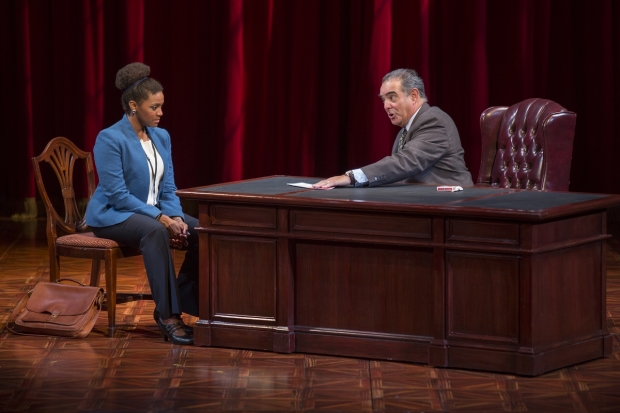The Originalist
Antonin Scalia is brought back to life in Arena Stage and Asolo Repertory Theatre’s coproduction at Pasadena Playhouse.

(© Jim Cox Photography)
Pugilist, contrarian, hunter, patriot, opera lover, originalist — Supreme Court Justice Antonin Scalia proudly wore all of these titles and several others. The Scalia brought to life by Edward Gero in the Pasadena Playhouse's production of John Strand's The Originalist also earned the title of monster, and the famously outspoken champion of the right wears that particular moniker like a $5,000 suit.
Monsters, when dramatically credible, can be delicious to watch. Secret softies, less so. The Originalist's Scalia falls uncomfortably between these two poles. In the play's fictionalized scenario, the 77-year-old take-no-prisoners justice mixes it up with a unique sparring partner: a young African American "flaming liberal" named Cat who serves as his clerk from 2012-13. Amid the Supreme Court's consideration of, among other cases, the Defense of Marriage Act (DOMA), Cat looks to move her hugely conservative a boss a few precious inches to the center while the unmoving Scalia tries to overhaul Cat's opinions and values.
Cat (Jade Wheeler) bursts into Scalia's life when she repeatedly interrupts his address to a law school class. The self-adoring judge is not amused at being challenged and nearly has her thrown out of the room, but she's too smart to be dismissed. When the same young woman presents herself to the judge as a highly qualified Harvard Law School graduate seeking a clerkship, Scalia recognizes the possibility of hiring an opponent who can be his punching bag and debate partner. In truth, each character has significantly underestimated the other, and Scalia and Cat — who philosophically have nothing in common — end up as unlikely friends.
When they are not engaged in debating the viability of a "living" Constitution, the characters allow key biographical data to emerge. Cat's an overachiever with a father in hospice. Scalia, still smarting over not having been named chief justice, finds himself on the dissenting end of too many opinions and is starting to feel his age. As Team Scalia gears up for the court's consideration of United States v. Windsor (which ended up overturning DOMA), the justice brings in another clerk, the toadyish Brad (Brett Mack), to roil the waters even further, and opens up a plot revelation that any viewer should see coming from here to the Potomac.
Under Molly Smith's direction, The Originalist gives off its flintiest sparks when justice and clerk are in battle mode. When Gero and Wheeler start laying into each other, the play feels like a town hall debate between a great — if dangerously controversial — legal mind and a young buck. Strand's characterization of Scalia, drawn from his writing, feels largely correct, and Gero's physical resemblance to the late justice is striking. More problematic, however, is the contention that Scalia would let a woman like Cat anywhere near his office, much less bond with her over cards or guns.
For a play that tries to pivot around the nuance of constitutional interpretation, Smith's production often feels ham-fisted. Between the operatic strains during scene breaks and the scenes staged in an indoor firing range, The Originalist heavily underlines its metaphors and contains no surprises. Much of the action takes place in the justice's chambers around an enormous wooden desk (designed by Misha Kachman). By the time Scalia and Cat are drawing cards at that desk and playing high stakes blackjack over whether the clerk's wording will make it into a Scalia decision, reality has been left far behind.
Gero, who originated the role at Arena Stage, has a plummy voice, a stooped and slightly shuffling gait, and the majesty of a man accustomed to owning the last word. As hateful as the character he is playing may be to many viewers, Gero's Scalia is too charismatic to despise. Wheeler does the best she can with a character that feels more like a dramatic plot device than a human being. Mack's bootlicking acolyte has even less to work with, but he is effective as well.
Ultimately, the play is an idealistic 90-minute prayer for compassion and understanding, both of which are in dangerously short supply right now. There are certainly worse things to wish for, but it seems naive to have a man who's famous for using a slightly vulgar brush-off gesture be the one brandishing an olive branch.









